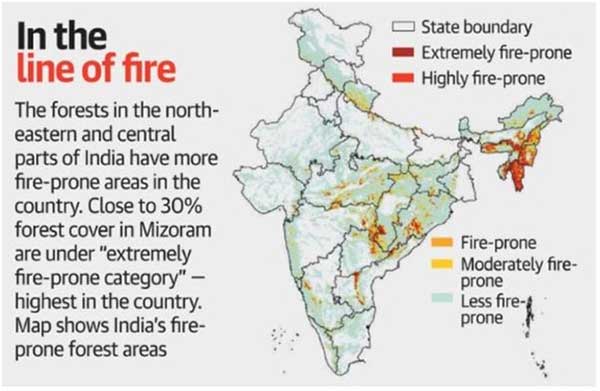Date : 15/06/2023
Relevance : GS Paper 3 : Disaster Management
Main Points: Long-continuing currents (LCC),Forest Fire, Climate change
Context -
- The recent surge in wildfires in Canada has raised concerns about the role of lightning in igniting these devastating natural disasters. Lightning, known to be the main precursor of wildfires, is expected to become more common in a warming world.
- This phenomenon is not exclusive to Canada, as India has also experienced the deadly consequences of lightning strikes.
- Recognizing lightning as an essential climate variable, its impact on global climate patterns cannot be ignored
Increasing Wildfires Caused by Lightning:
- The ongoing wildfires in Canada, particularly in British Columbia, Alberta, Quebec, Ontario, and Nova Scotia, have been primarily attributed to lightning strikes.
- Reports indicate that human activities have also contributed to the severity of these forest fires.
- A study published in Nature highlights the connection between lightning and wildfires, emphasizing the role of long-continuing currents (LCC) in igniting fires. The study projects an increase in global lightning activity and LCCs by the 2090s, accompanied by a rise in surface temperatures.
What is long-continuing currents (LCC)?
Lightning flashes containing a discharge in which a continuing electrical current flows for more than 40 ms are usually referred to as long-continuing-current lightning (LCC lightning)
Understanding Lightning and its Climate Indicators:
- Lightning occurs when static electrical charges build up within thunderstorm clouds, leading to a rapid discharge of electric charge.
- Changes in lightning patterns have been identified as climate indicators, reflecting the broader impact of the climate crisis.
- The World Meteorological Organization recognizes lightning as a critical variable in characterizing the Earth's climate.
- Lightning also contributes to the formation of greenhouse gases such as ozone through the production of nitrogen oxides.
Lightning Strikes in India:
- In India, lightning strikes have become the deadliest natural disaster in recent years. The country witnessed a significant increase in lightning strikes, with approximately 18.5 million strikes between April 2020 and March 2021, marking a 34% rise compared to the previous year.
- The Indian Institute of Tropical Meteorology reports a sharp uptick in lightning strikes since 1995. While lightning-related deaths have occurred across various states, efforts to raise awareness and provide safer shelter options have resulted in a decrease in strikes in certain regions.
Implications for North America and Central Asia:
- While simulations suggest that total lightning activity may decrease in certain regions of North America and Central Asia, there is a potential increase in LCC lightning activity.
- This shift could lead to a higher risk of lightning-ignited wildfires. It is crucial to recognize the changing dynamics of lightning patterns and their impact on regional wildfire risks.
Conclusion:
The increasing occurrence of wildfires linked to lightning strikes in Canada highlights the urgency of addressing the climate crisis. Lightning serves as an essential climate variable, shaping the Earth's climate patterns. To mitigate the risks associated with wildfires, comprehensive strategies are required, including improved preparedness, early warning systems, and public awareness campaigns. By understanding the relationship between lightning, wildfires, and climate change, we can take proactive measures to protect ecosystems, lives, and property from the devastating consequences of these natural disasters.
Probable Question for Mains exam-
- Question 1: Examine the impact of the climate crisis on lightning patterns and its significance as an essential climate variable. How does lightning serve as an indicator of climate change? (10 Marks, 150Words)
- Question 2: Evaluate the implications of increasing lightning strikes in India, emphasizing their significance as the deadliest natural disaster in recent years. Discuss the measures taken to reduce lightning-related fatalities and improve public safety. (15 Marks ,250 Words)
Source The Hindu







